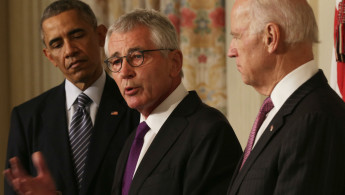Syria, IS, hostile Congress await next secretary of defence
Last week, US President Barack Obama accepted the resignation of Secretary of Defence Chuck Hagel, in what many now agree was in effect a dismissal. Almost without emotion, Obama said during the brief White House ceremony that Hagel would stay on until a suitable replacement is nominated and confirmed.
A week later, however, no nominations have been announced by the White House or leaked to the press by any of the White House staff usually so eager to promote their own candidate.
Some Washington insiders – a breed whose cynicism is legendary – accuse Obama of deliberately choosing to boot
| Everyone is reluctant to topple Assad, because they fear that Syria will become another Libya except more dangerous - Tony Shaffer |
out Hagel three days before the traditional American holiday of Thanksgiving (27 November) to give himself a break from the inevitable media scrutiny or congressional criticism.
The Thanksgiving holiday, a uniquely American feast of excessive food, drink, family and friends, falls always on the fourth Thursday of November, and people plan their hectic travels around it months in advance, giving Washington – a city of non-natives – an almost deserted feel for four straight days. Noticeably, there was little discussion this past weekend on the topic of replacing the defence secretary, an issue that would have otherwise engendered a great deal of interest.
And while the timeline for his replacement remains uncertain, we are certain who is not in the running. In the immediate aftermath of Hagel's dismissal, three names were bandied about a lot: Jack Reed, a Democratic Senator, Michele Flournoy, a former undersecretary of defence for policy, and Ashton Carter, a former deputy secretary of defence. But by Wednesday last, just before the holiday began, both Reed and Flournoy had taken themselves out of the running.
On Tuesday, in a surprise move, Jeh Johnson, head of the Department of Homeland Security (DHS) also withdrew his name. Johnson's withdrawal was disappointing to civil liberties activists, who expected that a man who had been the top lawyer at the Pentagon between 2009 and 2012 and played a key role in efforts to close the infamous detention facility at Guantanamo, would get a chance to complete those efforts.
With Flournoy, Reed and Johnson out, Carter is emerging as the prime contender. Like Hagel, Carter is known as understated and with ties to defence industry contractors. And although he would bring with him the advantage of having been already confirmed as deputy secretary, he would still face close scrutiny during the Senate Confirmation Hearings – likely by Democratic Senators – for having co-authored a piece in Time Magazine in 2006 calling on then President George W. Bush to conduct surgical strikes on North Korean nuclear facilities.
Another top candidate is Bob Work, the current deputy secretary of defence, (and chairman of the Nuclear Deterrent Enterprise Review Group) who has inherited much of Carter's portfolio overseeing budget cuts for the Pentagon, is a 27-year military veteran and a former navy undersecretary.
Other names that have been floated include Navy Secretary Ray Mabus, a former governor of Mississippi and ambassador to Saudi Arabia, and Air Force Secretary (USAF) Deborah James, who before taking over the huge air-force budget ($110 billion), consulted or worked for defence industry contractors.
Whoever the nominee, she or he will face an uphill confirmation battle in the Senate when the new Congress convenes in January 2015. Republicans control both houses of congress now and are as determined as ever to obstruct Obama’s presidency.
More importantly, once confirmed, the new defence chief will face huge national security challenges at a time of complicated relations between the Pentagon, the White House and Congress. Reform advocates from both the right and the left are demanding "better matching of American military strategy to available resources", pursuing what they believe to be long overdue cost saving reforms, and putting "an end to the abuse of Overseas Contingency Operations (OCO) funds", not only handling, but also gaining authorization for the war against the Islamic State group (IS formerly known as ISIS), despite spending $640 billion a year on defence, or more than the next 10 big defence-spending countries combined.
Regarding the strategy to "degrade and defeat" the IS group, the common feeling in Washington is that the Obama administration, by its own admission, has no strategy. The White House is accused of failing to communicate with either the Pentagon or Congress over how to combat ISIS whether in Iraq or in Syria, or chart the future for this war, especially in the absence of Congressional authorization. Hagel himself acknowledged during a Congressional testimony last month that he did not know what the administration was considering, and his concerns about the absence of a strategy may have led to his demise.
Additionally, whoever the new Secretary of Defence is, he or she must be good at schmoozing, not only the White House and Congress, but also the military brass. Hagel seems to have lost what little support he once had among senior officers, at least in part because he was not as effective a bureaucratic infighter on Pentagon budget issues as both his two immediate predecessors, Robert Gates and Leon Panetta were. Although it has almost limitless resources, the bloated US military budget wants more, claiming that available resources to the US military have been strained by the unprecedented scope of US wars abroad, and military demands from the Middle East and West Africa to Europe, and from the Pacific to Central Asia. Hagel was increasingly being eclipsed by Chairman of the Joint Chiefs of Staff General Martin Dempsey, either in press briefings or before Congress.
Still, the war against IS will have top priority in the weeks and months ahead. It is an open secret in Washington that Hagel was fired in large part because the White House wanted more aggressive military goals in that fight. Some reports suggest that Hagel resisted White House efforts to target the Assad regime in Syria, and engendered the wrath of National Security Advisor Susan Rice, a storm that the non-confrontational departing Pentagon chief could not weather, giving those eager to strike "regime targets" in Syria an edge in this debate.
But the military in general, while it may go along with limited strikes against certain Syrian air defence capabilities, is not enthusiastic about such an adventure. Retired Lt. Col. Tony Shaffer, a Washington-based fellow at The London Center for Policy Research (LCPR) with close ties to the Pentagon, said, "everyone is reluctant to target regime assets and topple Assad, because they fear that Syria will become another Libya except more dangerous to US interests."
Shaffer, who led special operations in Afghanistan in 2001-2003 with strong ties to the intelligence community says, "We already lost Afghanistan to terrorists, and toppling Assad would do the same to Syria."
All speculation notwithstanding, the common impression is this White House lacks a coherent strategy that it can implement effectively in the volatile Middle East. No one believes any nominee has a magic wand to wave a strategy into existence most experts believe the Obama administration will remain searching for an "illusive strategy" that, on the one hand, is able to assert American global leadership, and, on the other, can keep US involvement in foreign wars restricted to air strikes.



